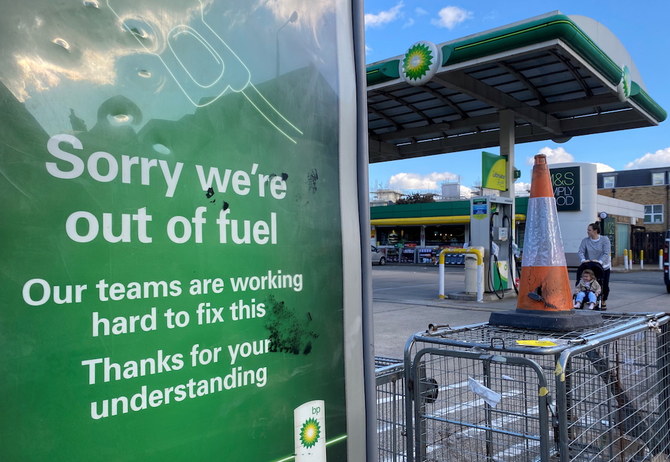
by arabnews.com -- LONDON: Hours of queues at gas stations in Britain have left Lebanese in the country reeling from an unpleasant deja vu as the UK found itself suffering similar problems to the crisis-riddled Middle Eastern nation. Gas station pumps ran dry in major British cities on Monday and vendors rationed sales as a shortage of truckers strained supply chains to breaking point in the world’s fifth-largest economy. “Fuel shortage in Lebanon, people queuing to buy gas. Left Lebanon, came to the UK. Fuel shortage in the UK, people queuing to buy gas. AM I CURSED?” Tweeted Ibrahim Abdallah. A dire shortage of lorry drivers as the coronavirus disease (COVID-19) pandemic recedes has sewn chaos throughout British supply chains in everything from food to fuel, raising the spectre of disruptions and price rises as Christmas looms. Lebanese who left their home to live or study in the UK cannot help but feel as if their problems are not too far behind, with the country going into its second month of fuel crisis. “Fuel shortages? Is this the UK or Lebanon?” wrote Amir.
Pumps across British cities were either closed or had signs saying fuel was unavailable on Monday, local media reported, with some limiting the amount of fuel each customer could buy. “Long fuel queues in London have led to road blocking…I’m sure they do it just for me so I wouldn’t miss Lebanon much while I’m away!” wrote MidEast Correspondent for BBC World Service Nafiseh Kohnavard. “On the weekend before my flight to Beirut: Fuel shortages causing queues at UK petrol stations, Bojo considering using army to supply petrol stations, 10 hour power outage in my building. Is the Universe training me for my stay in Lebanon?” Asked Yara.
By Maha El Dahan and Laila Bassam BEIRUT (Reuters) – Prime Minister Najib Mikati will meet with the advisory firm Lazard soon …
![People queue to refill domestic gas cylinders at a petrol station in the Ouzai area of the capital Beirut [Nabil Mounzer/EPA-EFE]](https://www.aljazeera.com/wp-content/uploads/2021/09/h_57129647.jpg?resize=770%2C513)
By By Robert McKelvey -- aljazeera.com -- Beirut, Lebanon – With Prime Minister Najib Mikati’s new cabinet having won a parliamentary confidence vote, many Lebanese are tentatively hopeful the years-long crisis that has engulfed their country may finally have reached a turning point. At the same time, there are concerns this new cabinet – filled with many familiar faces – represents just another continuation of a status quo that increasing numbers of Lebanese wish to see ended.
Has Lebanon found a lifeline? Speaking to Al Jazeera, people expressed their feelings on Mikati’s new government and his plans to address their country’s numerous woes after 13 months of political deadlock. “We hope it will be good for the country because the people are tired,” said Jihad Jaber, owner of a clothing shop in Hamra, Beirut. “We’re seeing it seems like they’re willing to work, unlike the last cabinet. We’ll have to wait and see. As citizens, we ask for them to solve these crises, from the fuel shortage to the poor quality of life, and for the dollar rate to come down. We want to live well.” Spiralling financial meltdown -- According to recent figures published by the United Nations Economic and Social Commission for Western Asia (ESCWA), almost 75 percent of the Lebanese population are currently living in poverty. Even basic amenities such as electricity and water are in short supply, while residents queue for hours at a time outside petrol stations hoping to buy fuel for their cars and generators.
في ذكرى تأسيس امن الدولة نثمن دور قيادتها وضباطها وافرادها ونتمنى تفعيل دورها لتنفيذ المهمات التي عهدت لها وفق قانون انشائها
Khazen History


Historical Feature:
Churches and Monasteries of the Khazen family

St. Anthony of Padua Church in Ballouneh
Mar Abda Church in Bakaatit Kanaan
Saint Michael Church in Bkaatouta
Saint Therese Church in Qolayaat
Saint Simeon Stylites (مار سمعان العامودي) Church In Ajaltoun
Virgin Mary Church (سيدة المعونات) in Sheilé
Assumption of Mary Church in Ballouneh
1 - The sword of the Maronite Prince
2 - LES KHAZEN CONSULS DE FRANCE
3 - LES MARONITES & LES KHAZEN
4 - LES MAAN & LES KHAZEN
5 - ORIGINE DE LA FAMILLE
Population Movements to Keserwan - The Khazens and The Maans
ما جاء عن الثورة في المقاطعة الكسروانية
ثورة أهالي كسروان على المشايخ الخوازنة وأسبابها
Origins of the "Prince of Maronite" Title
Growing diversity: the Khazin sheiks and the clergy in the first decades of the 18th century
Historical Members:
Barbar Beik El Khazen [English]
Patriach Toubia Kaiss El Khazen(Biography & Life Part1 Part2) (Arabic)
Patriach Youssef Dargham El Khazen (Cont'd)
Cheikh Bishara Jafal El Khazen
Patriarch Youssef Raji El Khazen
The Martyrs Cheikh Philippe & Cheikh Farid El Khazen
Cheikh Nawfal El Khazen (Consul De France)
Cheikh Hossun El Khazen (Consul De France)
Cheikh Abou-Nawfal El Khazen (Consul De France)
Cheikh Francis Abee Nader & his son Yousef
Cheikh Abou-Kanso El Khazen (Consul De France)
Cheikh Abou Nader El Khazen
Cheikh Chafic El Khazen
Cheikh Keserwan El Khazen
Cheikh Serhal El Khazen [English]
Cheikh Rafiq El Khazen [English]
Cheikh Hanna El Khazen
Cheikha Arzi El Khazen
Marie El Khazen